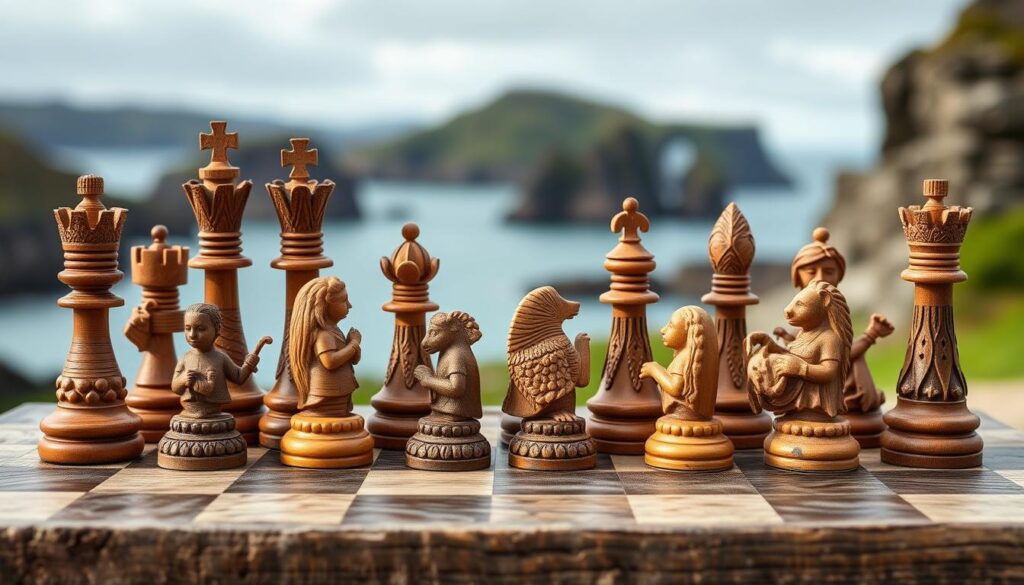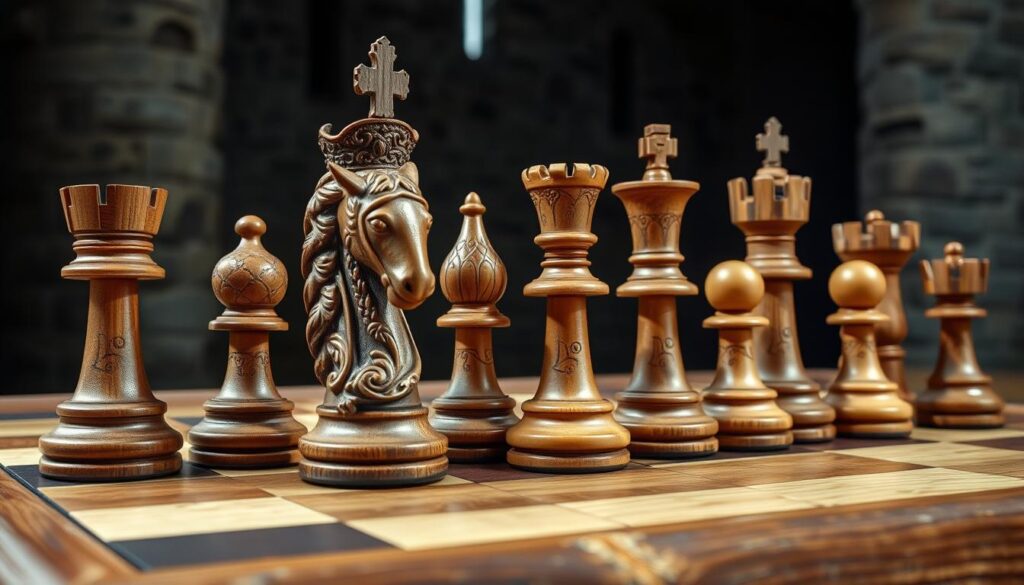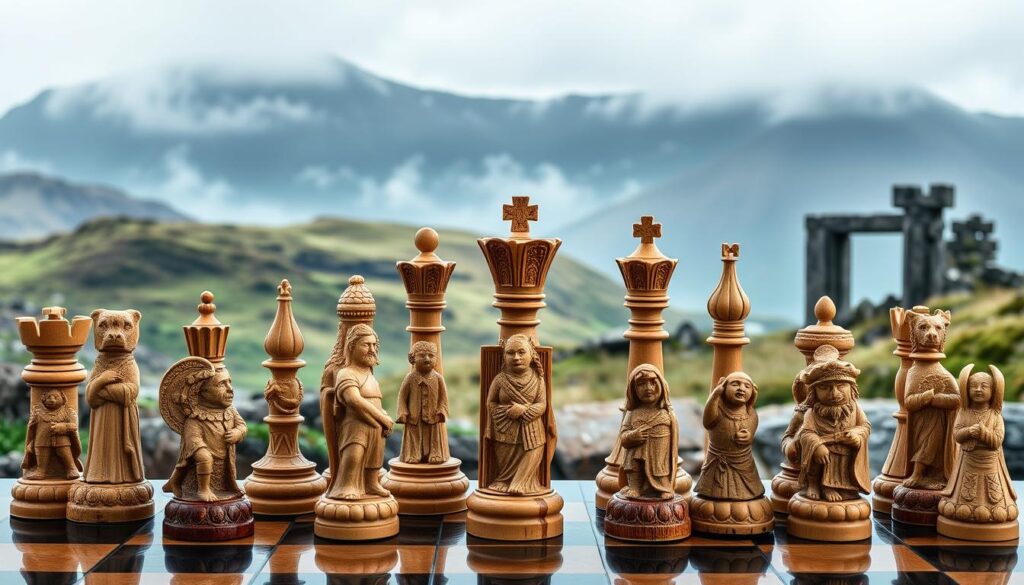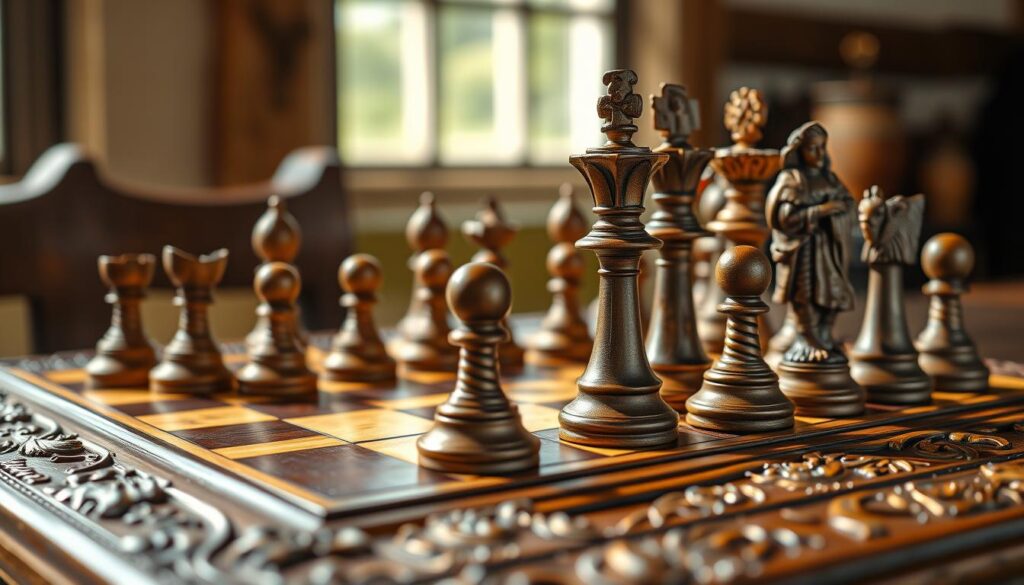Have you ever held a piece of history in your hands? The Isle of Lewis chess pieces UK story is one of excitement. Found in 1831 on the Isle of Lewis in Scotland, these chess figures date back to the 12th century. They are known for their detailed carvings and the mystery of where they came from.
Table of Contents
The Discovery and Origins of Lewis Chessmen Collection
In 1831, the lewis chess pieces scotland were found on the isle of lewis chess pieces in Scotland’s Outer Hebrides. These 12th-century chess pieces have sparked many theories about their origins and importance.
Historians say they were discovered in a sand dune near Uig Bay by a local crofter named Malcolm MacLeod. It’s believed they were made in Norway, possibly in Trondheim, in the 12th or 13th century. They might have belonged to a wealthy Viking chieftain or a high-ranking official in the medieval Kingdom of the Isles.
“The Lewis Chessmen have been a major source of amusement and fascination, becoming a classic set that is highly popular.”
Some think the chessmen were a gift from a Norwegian king to strengthen ties with the Hebrides. Others believe they were carried by a merchant. But their exact origin, the lewis chess pieces scotland have captured the hearts of many, ensuring their lasting legacy.
The isle of lewis chess pieces symbolize Scotland’s rich cultural heritage. They have inspired many replicas and collector’s editions. Today, the original pieces are split between the British Museum in London and the National Museum of Scotland in Edinburgh, sparking debates about where they belong.
Exploring the Original Isle of Lewis Chess Pieces UK
The Isle of Lewis chess pieces, known as the Lewis Chessmen, have fascinated many. Found in Scotland in 1831, they date back to the 12th century. They were made from walrus ivory.
These chess pieces vary in size, from 3.5 centimeters to 5.8 centimeters. They show the culture of the Norse regions. You’ll see kings, queens, warriors, and bishops.
The rooks, or “warders,” stand out. They are shown biting their shields, like Viking berserkers. Studies show that while most pieces are walrus ivory, the knights are whale tooth. This adds to their diversity.
“The remarkable condition of the Lewis Chessmen suggests they were carefully stored, possibly in a leather bag, before being buried and preserved for centuries.”
The chess pieces’ great condition shows their craftsmanship and care. Their details and cultural mix make them a marvel of medieval art. They offer a glimpse into the past.

The Isle of Lewis chess pieces continue to captivate and inspire. They show the lasting charm of chess and the rich culture around it.
Artistic Details and Medieval Symbolism in Chess Pieces
The Lewis Chessmen, found on the Isle of Lewis in Scotland in 1831, are a marvel of art and symbolism. Each piece is a window into 12th-century Europe’s culture. The kings and queens show emotion, while the knights and bishops tell stories of power and faith.
The kings sit with their legs crossed, showing their power. The queens sit with their heads in their hands, looking thoughtful. The bishops wear miters and hold crosiers, showing their religious role. The knights, on horseback, symbolize chivalry and war. The rooks, strong warriors, are ready to defend their spots on the board.
“The Lewis Chessmen are a true treasure trove, offering a window into the artistic and cultural sensibilities of their time. Each piece is a masterpiece in its own right, imbued with the spirit of the Middle Ages.”
The Lewis Chessmen reveal a lot about medieval European chess. They show the kings’ power and the bishops’ faith. These pieces give us a peek into life in the 12th century and why chess is still loved today.

The Lewis Chessmen’s detailed designs and emotions continue to amaze people around the world. They inspire new fans to learn about the history and culture behind this amazing chess set.
Museum Collections and Historical Preservation
The lewis chess pieces from the Isle of Lewis in Scotland are now in two famous places. The British Museum in London has 82 of these medieval treasures. The National Museum of Scotland in Edinburgh has the other 11. Visitors can see the detailed work and learn about the chess pieces’ history up close.
The museums work hard to keep and study these pieces. They use special tools like microscopes and X-rays to learn more. This helps us understand how these chess pieces were made nearly 800 years ago.
“The display at the National Museum of Scotland in Edinburgh now allows visitors to appreciate the pieces ‘in the round,’ seeing them from all angles.”
The museums make sure these treasures last for future generations. People from all over can see the lewis chess pieces scotland. The ongoing research and educational programs make these pieces even more special.

Modern Replicas and Collector’s Editions
For those who love chess, high-quality replicas of the Isle of Lewis chess pieces are available in the UK. Companies like Official Staunton and the Regency Chess Company make authentic copies. These pieces are made from durable materials like resin or wood, lasting long while keeping the medieval look.
These replicas come in different editions, including traditional ivory and ebony sets. Some have unique red and ivory pieces. They also come with luxury gift boxes, extra queens, and authenticity certificates. This makes them perfect for both collectors and players who value history.
The UK is known for its skilled artisans and high craftsmanship. This makes it a great place for making these replicas. These modern pieces let you own a piece of history and enjoy the game of chess in a special way.

Whether you’re a seasoned collector or just starting to appreciate the Lewis chessmen, these replicas are a great choice. They show great detail and stick to historical accuracy. These chess sets celebrate the Isle of Lewis chess pieces and their impact on UK culture and history.
Cultural Impact and Historical Legacy
The Lewis Chessmen have made a lasting impact on popular culture and chess design. These 12th-century pieces have inspired many modern chess sets. They’ve also appeared in movies like “Harry Potter and the Sorcerer’s Stone,” reaching fans everywhere.
These chessmen have become symbols of Scotland and Norse heritage. They’ve sparked interest in medieval history and the game of chess. This shows how they’ve grown beyond just gaming pieces.
The Lewis Chessmen have also inspired art and academic studies. Their value was shown when a missing piece sold for nearly a million dollars at Sotheby’s in 2019. They continue to fascinate people, whether you love chess, history, or beautiful craftsmanship.
Learning about the Lewis Chessmen’s cultural impact and history will deepen your appreciation for them. They’ve gone beyond their original use. This knowledge will make your chess games more meaningful and connect you to the game’s enduring charm.
FAQ
What are the Isle of Lewis chess pieces uk ?
The Lewis chess pieces are a 12th-century chess set. They were found in 1831 on the Isle of Lewis in Scotland. Made from walrus ivory and whale teeth, they show medieval Norse culture and skill.
Where were the Lewis Chessmen found?
The Lewis Chessmen were found in a sand dune near Uig Bay on the Isle of Lewis. There are many stories about how they were discovered. One says a local crofter named Malcolm MacLead found them in a stone chamber.
What is the origin of the Lewis Chessmen?
Experts think the Lewis Chessmen came from Norway, possibly Trondheim, in the 12th or 13th century. They might have belonged to a rich person, like a Viking chieftain or a local ruler in the medieval kingdom of Isles.
What materials are the Lewis Chessmen made of?
The Lewis Chess Pieces or the Isle of Lewis Chess Pieces UK are primarily made of walrus ivory and whale teeth. These remarkable artifacts, discovered on the Isle of Lewis in Scotland, represent medieval chess sets that date back to the 12th century. The craftsmanship of the Isle of Lewis Chess Pieces UK reflects the detailed carving techniques of the Norse artisans. The use of durable and exquisite materials like walrus ivory emphasizes their cultural and historical significance, making the Lewis Chess Pieces an iconic treasure of medieval art.

















